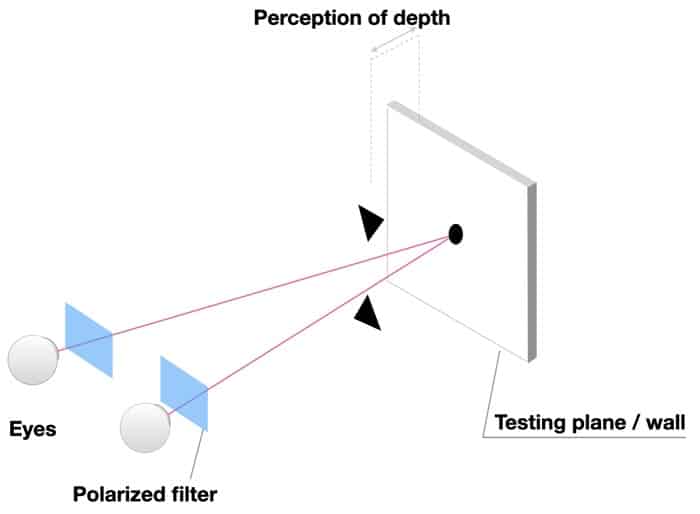In this article, you will learn how glasses can affect your depth perception for the better or for the worse and what you can do about it. I am a master optician and in most cases, issues in-depth perception show up during the measurements for the glasses.
Glasses do affect depth perception of depth with prismatic effects every prescription lens has. When the depth of perception is reduced due to an asymmetric interplay of the eye muscles special prismatic lenses can oftentimes lead to an improvement in in-depth perception. Because the outer eye muscles needed for movement can relax and the light then travels on the optimal spots in the eye.
When there is less muscle tension with glasses to fuse the pictures together of both eyes depth of perception will be improved. But when the lens power is needed to be different in both eyes (anisometropia) depth of perception can be reduced depending on where you look through the lenses.
Prismatic effects lead to a shifted perception of the picture. Depending on how much and where the pictures shift your eyes will have an easier or harder time fusing both pictures together (in-depth explanation below). When your eyes (visual system) need to strain more to fuse both pictures together depth perception will suffer.
It can be tested how the glasses prescription affects depth of perception with tests where both eyes are tested simultaneously and the person with the testing frame needs to identify objects with increasing difficulty in regards of the depth perception.

Do Glasses Change Depth Perception?
Glasses change depth perception for the better as well as up to a point where it is not existent anymore. Usually when both eyes have similar prescriptions depth perception is will not be worse with glasses. But when the lenses are not centered correctly prismatic side effects come into play which can lead to increased eye strain and therefore less capable of the visual system to produce perceive depth in a room.
Those side effects can be caused by a wrong position during the measurement of the pupillary distance or even the height where the optical centers of the lenses need to being positioned in the glasses.
But side effects are not only produced by errors the optician made. Oftentimes the difference between the lens power for the right eye and the left eye induces prismatic effects. When they are willingly implemented into the prescription due to an asymmetric position of one eye depth perception will be improved. When they are induced due to the difference of both lenses the eye muscles need to work harder to compensate for the shifting pictures the prismatic effects produce.
As you can see in the picture below the object behind the image changes its position depending on how the lenses are positioned. With a bigger difference between both lenses, this shift gets bigger. In some cases, people not only have less perception of depth but even headaches or diplopia.

When you look at the images above compare the red lines. On the right image, the red line is positioned at the same height behind both lenses. But in the left image, the red line in the left lens will be perceived as higher as in the right lens. Why? Due to the prismatic effects.
Every lens has them and when you perform eye movements away from the optical center of the lens depth perception could suffer because your eyes need to compensate for the difference in lens powers that produces the shift.
Read on to know about the situation so you may be able to perceive depth a little better even when you need vastly different lens powers.
Is It Normal For Depth Perception To Be Off With Glasses?
Yes, it can be normal for depth perception to be off with glasses especially when your prescription got an update. This update produces different image shifts which your eye muscles first need to adapt to. But what if when depth perception is so off you can not adapt to the glasses? The answer is contact lenses. With contact lenses on your eyes, the prismatic side effects that produced the sifting of the image will be gone.
But also hybrid solutions can lead to success. In some of my clients, I used a combination of glasses and contacts to get rid of the prismatic side effects. This can be done when for example progressive lenses are needed and the difference of lens powers leads to headaches or discomfort.
Then an added contact lens can reduce or eliminate the difference between both eyes. What happens the glasses still produce prismatic effects but when they produce the same prismatic effects for both eyes they will not be problematic. When you feel the depth of perception is off with your glasses definitely talk to an eye care professional. He or she will then check the following things to see if they cause problems.
- mispositioned optical center
- wrong lens power
When you are not looking through the correct spots on the lenses your perception of depth will be probably off and potentially even your visual acuity. In some cases, wrong lens power does not show in a loss of visual acuity but in the way how you perceive depth. After an extensive check-up, the optician or optometrist will have a solution for you to troubleshoot the way your eyes play together.
It is important to understand also the best glasses can give you a level of depth perception you learned as a child. When depth perception is off and it was never learned due to a lazy eye for example you may not be able to improve the way you perceive depth.
Conclusion
Perception of depth can be off with glasses improved or not influenced depending on the fitting of the lenses in front of the eye in combination with the needed lens power. When you feel the depth of perception is off do not hesitate and book an appointment right away to see why it is off.
I wish you a great day.
